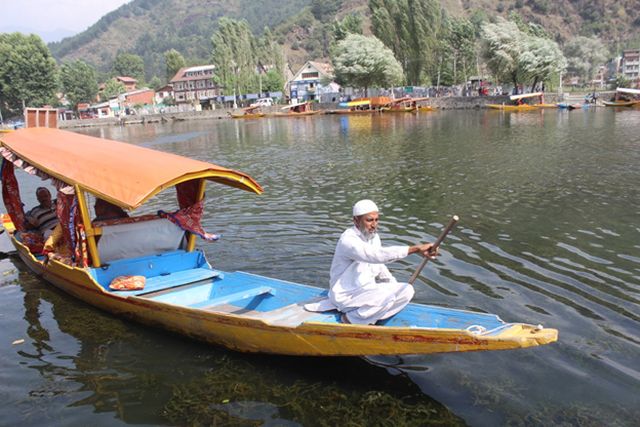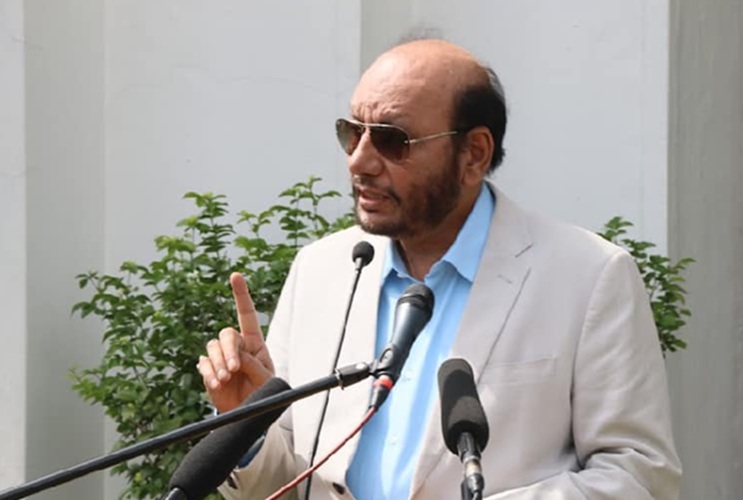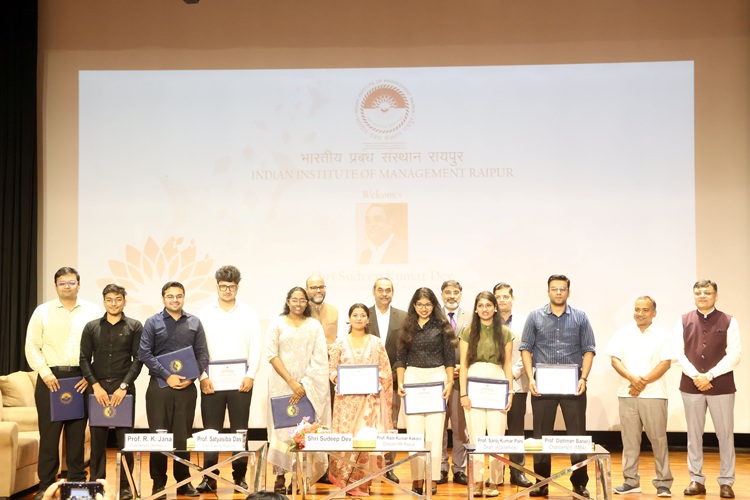“As the policy is mostly meant for the new industrial units only, should we bury the existing industries and build new ones on the graveyard of the buried ones?”
By Haroon Reshi
More than six months have passed since the Union Territory administration introduced Jammu and Kashmir Industrial Policy 2021-30. The new policy, which has come into effect on April 1, 2021, is primarily for new ventures and it also allows investments from outside.
However, experts say that the new industrial policy is yet to show its dividends and, in the meantime, the existing industrial units are grappling with distress.
The Federation of Chambers of Industries Kashmir (FCIK), a representative forum of industrial associations, recently claimed that 85% of the existing industrial units in the Valley might be closed down by March next year if the effective masseurs are not taken by the government. The FCIK has demanded the inclusion of existing industrial units into the recently-launched Rs 28,400-crore central industrial scheme.
To understand the present scenario of the existing industry, and as well as the upcoming ventures, KASHMIR IMAGES spoke with some experts. Here are the excerpts:
Tazayun Mukhtar
Director, Industries & Commerce, Kashmir
The J&K Industrial Policy 2021-30 is aimed at creating a conducive ecosystem for industry, which attracts investments in focused sectors leading to sustainable, equitable, and balanced industrial development. This will help creating employment opportunities for the youth, income generation, and overall development of the region. The policy intends to provide a regulatory environment within a supportive framework of ease of doing business.
Since the policy was introduced in April this year, we have received around 2500 applications for allotment of land at different estates in Kashmir Division. These applications are with proposed investment of around Rs. 15000 core, and employment generation of approximately 50,000 people. In this regard, the land appraisal and the allotment process is going on.
The eligible units under manufacturing and service sector will be granted incentives under New Central Sector Scheme for Industrial Development of Jammu and Kashmir.
Furthermore, in view of the Covid lock down in March 2020, the government has provided financial assistance – in terms of 5% interest subvention for 6 months; partial waiver of fixed electricity charges for 1 year; waiver of water charges for 6 months; time bound One Time Settlement (OTS); and Capital Infusion – to the MSMEs.
The Government has also come up with attractive credit exposure packages which will be made readily available at lower interest rates for operation and revival of the MSME sector, post Covid-19 pandemic. These packages include: Guaranteed Emergency Credit Line (GECL); Sub-ordinate Debt for stressed MSMEs; and Equity Infusion to MSMEs through Fund of Funds.
Mir Shahid Kamali
President of Federation Chamber of Industries, Kashmir (FCIK)
As a matter of fact, the existing industry in the Valley is ailing and on the verge of death. Worst, it is not been given any respite.
To make it clear, I must tell you the fact that Kashmir is not a viable place for industries. However, it was the government of India’s passion to put the place on the industrial map. For that, the centre would give certain concessions by way of incentives to the industrial units and the entrepreneurs in J&K from time to time. But since the constitutional changes took place in 2019, all the concessions and incentives have been withdrawn. Presently, the existing industry is left with no incentives and thus has fallen into deep trouble.
Since we have been already grappling with not conducive environment in terms of difficult terrain with no proper connectivity, we are unable to compete with the competitors from outside J&K. Even working environment in Kashmir is different from that of the other places across India. For example, we have just an eight-hour working schedule in our factories here in the Valley; while as the same factories in places like Delhi work 16 hours a day. They produce more, and more production means less cost of production. Also, we have only 10 working months here because of the harsh winter. Further, we do not have easy access to the raw material. As an industrialist, it takes me ten days to fetch the raw material to the Valley from outside, when it is bad weather. As if all this was not enough, VAT (Value Added Tax) has been replaced with the GST (Goods and Services Tax).
Look at the recent history to see the challenges that industries in Kashmir have been facing for quite a long time. We faced the worst floods in 2014. Then mass agitation in the Valley in 2016. In 2019, we had months-long lockdown following the abrogation of Article 370. And worst, the pandemic since past two years too played havoc. How is it possible that an industry grappling with these unnatural challenges will grow? We have lost everything. When I had started my industrial unit, it was a success story in a brief time; but now it has turned into a story of that time. Sadly, people at the helm do not understand the problems that industrialists are grappling with in Kashmir. Only the wearer knows where the shoe pinches. We, as a delegation, met Home Minister in Delhi and explained to him the situation industry in J&K is facing. We informed him about the fact the industries in Kashmir have got 30 percent erosion over the years. We demanded capital investment from the government. But nothing has happened so far.
Usually, every industrial policy carries a foreword announcing that the policy is meant for the new, as well as the existing industries. However, in the case of the Industrial Policy 2021-30, it is mostly meant for the new industrial units only. Should we bury the existing industries and then build new industries on the graveyard of the buried ones?
In my view, the government, if it wishes to, can help the existing industries by just issuing an administrative order saying that the Rs. 28,400 crore approved by Prime Minister would be applied on both – 2021-30 and 2016-26 Industrial Policies. That is the only way to help grow industries in Kashmir.
Shakeel Qalandar
Former President, Federation Chambers of Industries Kashmir (FCIK)
The existing industry in Kashmir is distressed and at the brink of closure. Many of the units have already been closed.
As far as the Industrial Policy 2021-30 is concerned, there is nothing in it for the existing industry, rather it is meant for the new investments and industrial ventures. However, the question is that if the government is not able to take care of the distressed existing industry, how can a prospective entrepreneur, or a prospective industrialist trust the newly announced policy? All the existing industrial units are the outcome of the earlier policies. They had been promised heaven. But after the abrogation of article 370, the existing units of the industry have been deprived of many incentives and concessions which were promised in earlier policies. By virtue of these policies, the existing industrial units had come to existence. Clearly, if you take away the promised incentives to the units in the midway, you are leaving them in a lurch. This is betrayal. For example, the earlier industrial policy had promised that all the government supplies would be procured from the local industrial units. However, after 2019, this has been changed. Now the government departments have been directed to procure their goods from a portal called GeM portal (Government e-Marketplace). Entrepreneurs from all over India, participate in the tendering process of this portal. Now tell me how is it possible for enterprises working in the worst kind of atmosphere, as we have in Kashmir, to compete with their counterparts in advanced states? That is why all the government orders have gone to the enterprises outside Kashmir. Even the mining contracts have gone to the people from outside Jammu Kashmir.
From the government, we have been listing about its investment intentions and the enhancing figures supposedly to boost up the existing industry in J&K; but sadly, they are proven mere verbal announcements. On the ground, I don’t see the government taking any effective steps to help the existing industry. Also, a lot has been said about the investment from the outside J&K. But it is yet to be seen who will be the first from being outside to invest in Jammu and Kashmir.
Ejaz Ayoub
Economic Analyst
The new industrial policy which is again a rudimentary document of land banks and subsidies might again fall woefully short in terms of rescuing this core sector of our economy out of its chronic miseries. Our industries are in dire need of reforms encompassing the entire industrial ecosystem and not just the elementary financial incentives on Plant and Machinery.
Normally, industrial policies across India and everywhere in the world are devised for existing as well as upcoming units. However, Jammu Kashmir’s New Industrial Policy 2021-30 is dangerously skewed towards new units. This has left the existing unit holders in a state of despair and hopelessness. Investors invest in an industrial ecosystem. If we think that business houses will shift their manufacturing plants to an isolated Himalayan region with treacherous road connectivity and conflict just because we are providing them a piece of land and basic incentives on establishing factories, we are grossly mistaken.
Manufacturing plant is only one of the cogs in the wheels of the supply chain. No matter how much resources you push into this one cog, the strength of the entire chain will still be determined by its weakest link. Men, material and markets – all these essential components which ensure the optimum utilization of the industrial capacity need smooth and reliable logistical connections. No matter how good your plant and machinery is, if your raw material gets choked for 15 days on Jammu-Srinagar highway and your finished products are not even able to reach Sonmarg, you are bound to fail. No amount of subsidies can cure this chronic disease marring the potential of our industries. The concept of establishing a dry-port for mitigating logistical disadvantages was a step in the right direction, but never saw the light of the day. This policy was expected to address that.
The stringent and inflexible nature of the debt contract (Bank Loans) and the volatile nature of our economy are logically poles apart. The survival of business in this turbulent environment depends largely on its ability to absorb income shocks. Facilitating listing of business on SME stock exchanges & opening equity route for the manufacturers would be one reform in such direction. Seeking relaxed norms in terms of debt repayment cycles from the RBI for lending towards manufacturing, in areas under Disturbed Areas Act, can also make a huge difference. Nothing of this critical impediment has been embarked upon.
J&K Industries need holistic reforms which go beyond the archaic approach of providing stimulus through subsidies and creating land banks. As long as chronic issues of poor logistical connectivity, electricity deprivation, paucity of skilled Human Resource, unreliable high speed internet, inaccessibility to equity and investment in research and development continue to be ignored, Industrial policies will continue to yield poor results.
Imran Murtaza
President, Industrialists Association Khonmoh (IAK)
As per my understanding, the guidelines and procedures for the New Industrial Policy 2021-30 are undefined to the extent that even the concerned departments are hesitant to work out solutions to the problems. Enter any concerned office; you will not get a clear-cut response to your queries. These guidelines either do not match the practical world, or they are so complicated that even the concerned departments feel hesitant to put these rules into practice.
Given the geographical disadvantage of this place, the industry in Kashmir needs a made-to-measure industrial policy. We require a policy that will help an entrepreneur at the grass-root level. We require industrial-specific schemes here; because our different industrial sectors have different requirements. But the new industrial policy does not give sector-specific attention to the problems.
Since Kashmir is a landlocked place, and even the only road to the outside world remains closed for most of the time in winters; the market for the local industry is restricted to the Valley only. Our industry badly needs a conducive environment and connectivity to the outside market. Sadly, the new industrial policy does not address any of these issues. Worst, the government has brought us under the GeM umbrella. Since our products are a bit costlier because of the non-availability of raw material here, we are unable to compete with enterprises from outside on the GeM portal. Similarly, our industry was toll tax exempted earlier, but this incentive has been taken away from us.
The existing industry requires a package and a policy that could address the grass-root level problems. In my view, the recent package approved by the Prime Minister should be applied for the existing units only. I say this because the existing industry is seriously distressed. Many units have already been closed down. If nothing is done, our industrial sector in Kashmir will get ruined, and that eventually would impact employment further.
(This piece was first published in Srinagar based daily ‘Kashmir Images’.)






0 Comments